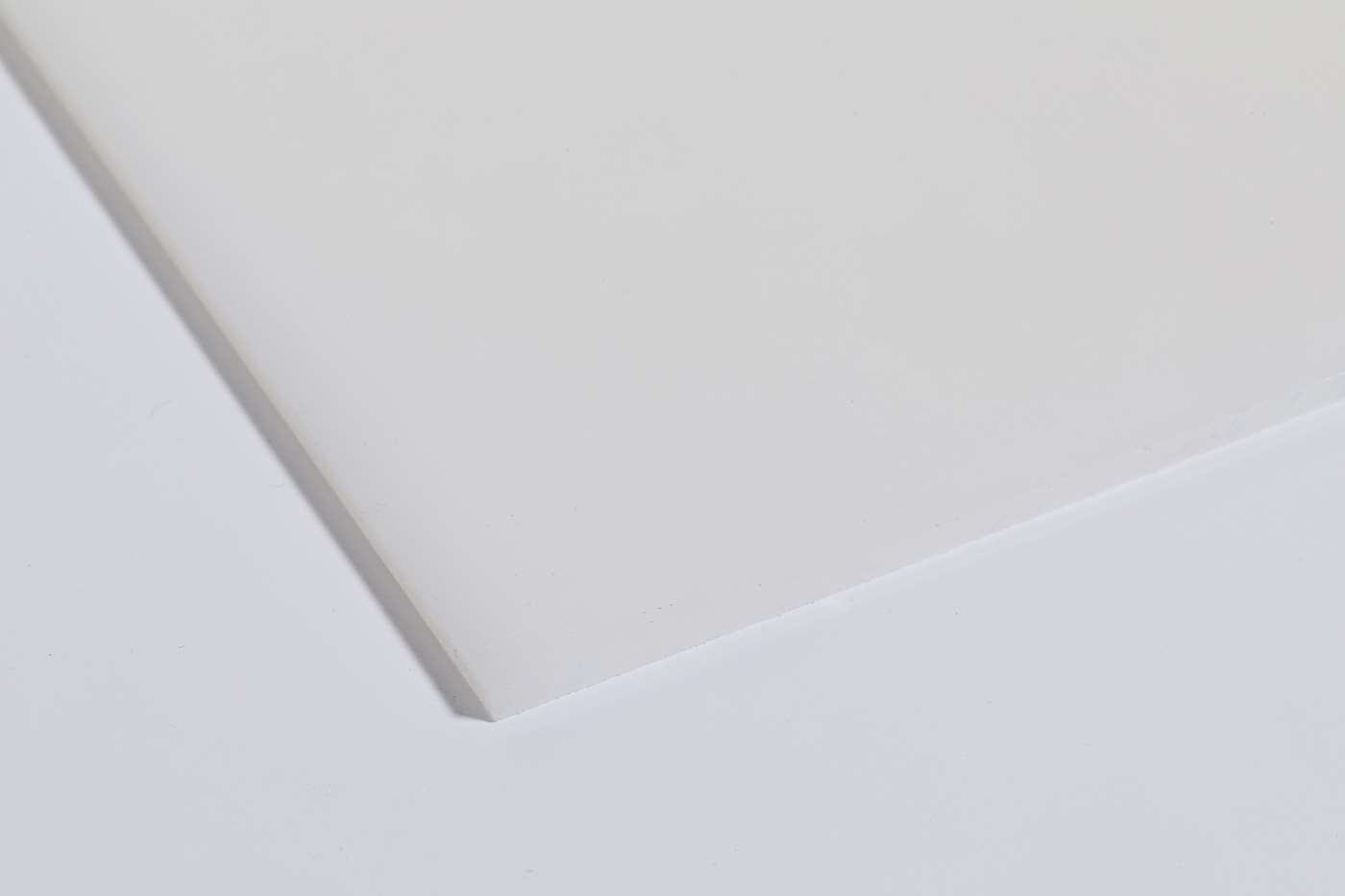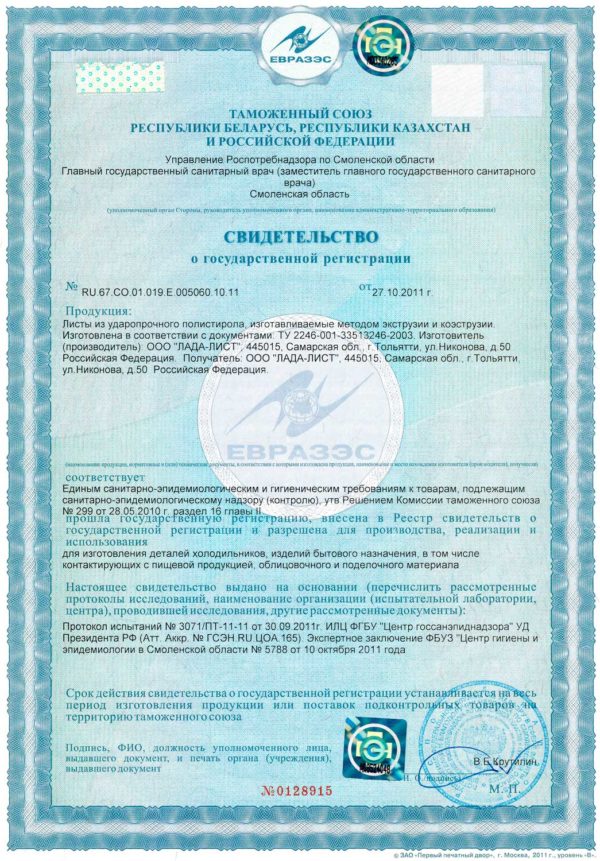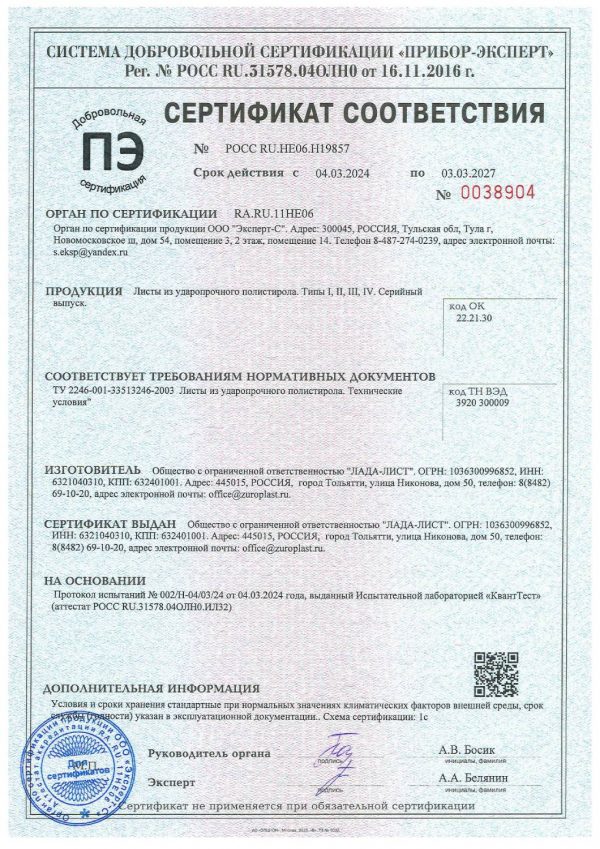Light-scattering polystyrene sheet is designed specifically for illuminated advertising, it is a cheaper alternative to acrylic glass and is widely used in the manufacture of any structures with internal lighting. Externally, it is identical to white acrylic glass, but, unlike plexiglass, it has only one glossy surface (outer). Light scattering polystyrene has more light scattering and impact resistance than an acrylic sheet.
It is easily vacuum formed and easily processed with tools and machines for processing wood and metal. It can be bonded with solvent-based adhesives (toluene, dichloromethane, butyl acetate).
We produce OPAL light scattering polystyrene with light scattering from 28% to 40%
Application area
- LED recessed or surface mounted luminaires for retail, office and domestic lighting
- Protective shades for lamps
- Light diffusers
- Light boxes
Processing methods
- Bonding with solvent-based adhesives (toluene, dichloromethane, butyl acetate) containing up to 20% polystyrene)
- Welding (thermal, thermal pulse, ultrasonic)
- Molding
- Felling
- Typographic printing
- Laser cutting
Delivery form
- Thickness from 1 to 10mm
- Width up to 2150mm
- Surface smooth and glossy
- Glossy surface protected by thermoformed PE film
Chemical properties
Resistant:
- To alkalis
- To acids other than nitric and acetic
- To oils
- To fats
- To lower alcohols
- To aliphatic hydrocarbons
- To phenols
- To simple ethers
Not resistant:
- To own monomers
- To aromatic and chlorinated hydrocarbons
- To complex esters
- To acetone
Operating temperature
- Maximum temperature of long-term operation: 75-80 °С
- The use of PS special grades makes it possible to operate products at temperatures up to minus 30 °C
Flammability indicators
- Burns up under the influence of a flame or due to an appropriate heat amount.
- Burns brightly and unstably after being removed from a flame with a strong smoky flame with the formation of soot
- Spontaneous combustion at 343 °C
- Fire from an external source at 486 °C
Characteristics of light scattering polystyrene
| Units | Testing Method, ISO | Value | ||
|---|---|---|---|---|
| Density | g/sm3 | 1183 | 1.05 | |
| Tensile yield strength | MPa | 527-2/1В/20 | 20 | |
| Elongation at break | % | 527 | 15 | |
| Charpy impact strength on sample without notch (rib) ( в ребро) | 23°С | kJ/m2 | 179/1еU | 7 |
| Charpy impact strength on notched specimen (rib) | 23°С | kJ/m2 | 179/1еА | 5 |
| Bending temperature under load | 1,8 MPa | °С | 75-2Ае | 80 |
* The above values refer to the state of the thermoplastics immediately after extrusion and do not take into account the effects of aging.
* The properties of the sheet may vary depending on the properties of the raw materials used
«Typical malfunctions during thermoforming and their elimination methods» you can download here
CALL US
8 (800) 770-05-52 (free within the Russian Federation)
Togliatti
+7 (8482) 69-10-20
+7 (8482) 69-10-30
+7 (8482) 69-10-31
Moscow
+7 (926) 838-75-93
+7 (915) 176-38-87
Rostov-on-Don
LEAVE AN APPLICATION ONLINE
You can also order plastic sheets
by filling out the detailed online order form on our website.
Additional Information
Light-scattering polystyrene is used to manufacture light diffusers and light-boxes, light boxes, signs, advertising panels, etc. Self-adhesive films, including those with a printed image or text, can be glued to lighting polystyrene products without compromising the illumination and overall design of the entire advertising medium, since the brightness and clarity of the image are preserved, there is no chiaroscuro from lighting lamps.
Light-scattering polystyrene sheet is produced by coextrusion of high-impact polystyrene and general-purpose polystyrene. Designed specifically for illuminated signage, it is an excellent substitute for acrylic glass in any interior illuminated structure. Outwardly, it is identical to white acrylic glass, but unlike plexiglass, it has only one glossy surface (outer).
Light-scattering polystyrene has more light scattering and impact resistance than acrylic sheet. It also differs in ease of processing and significantly lower cost. It is an excellent dielectric.
Light-scattering polystyrene has a high chemical resistance to dilute organic acids and alkali solutions, and to alcohols. Polystyrene is not resistant to organic solvents such as gasoline, ketones (acetone), benzene, chlorinated hydrocarbons, essential oils, fats.
It is easily formed and easily processed by tools and machines for processing wood and metal. Bonded with solvent-based adhesives (toluene, dichloromethane, butyl acetate).
It is welded by heat sealing, thermal pulse, ultrasonic welding.


